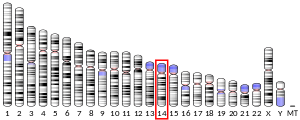TTC8
Tetratricopeptide repeat domain 8 (TTC8) also known as Bardet-Biedl syndrome 8 is a protein that in humans is encoded by the TTC8 gene.[5]
Function
TTC8 is associated with gamma-tubulin, BBS4, and PCM1 in the centrosome.[5] PCM1 in turn is involved in centriolar replication during ciliogenesis.[6]
TTC8 is located in the cilia of spermatids, retina, and bronchial epithelium cells.[5]
Clinical significance
Mutations in the TTC8 gene is one of 14 genes[7] identified as causal for Bardet-Biedl syndrome.[5][8]
References
- 1 2 3 GRCh38: Ensembl release 89: ENSG00000165533 - Ensembl, May 2017
- 1 2 3 GRCm38: Ensembl release 89: ENSMUSG00000021013 - Ensembl, May 2017
- ↑ "Human PubMed Reference:".
- ↑ "Mouse PubMed Reference:".
- 1 2 3 4 Ansley SJ, Badano JL, Blacque OE, Hill J, Hoskins BE, Leitch CC, Kim JC, Ross AJ, Eichers ER, Teslovich TM, Mah AK, Johnsen RC, Cavender JC, Lewis RA, Leroux MR, Beales PL, Katsanis N (October 2003). "Basal body dysfunction is a likely cause of pleiotropic Bardet-Biedl syndrome". Nature. 425 (6958): 628–33. doi:10.1038/nature02030. PMID 14520415.
- ↑ Kubo A, Sasaki H, Yuba-Kubo A, Tsukita S, Shiina N (November 1999). "Centriolar satellites: molecular characterization, ATP-dependent movement toward centrioles and possible involvement in ciliogenesis". J. Cell Biol. 147 (5): 969–80. doi:10.1083/jcb.147.5.969. PMC 2169353. PMID 10579718.
- ↑ Hamosh, Ada (2012-11-02). "OMIM entry #209900 Bardet-Biedl Syndrome; BBS". Online Mendelian Inheritance in Man. McKusick-Nathans Institute of Genetic Medicine, Johns Hopkins University School of Medicine. Retrieved 2013-09-04.
- ↑ Stoetzel C, Laurier V, Faivre L, Mégarbané A, Perrin-Schmitt F, Verloes A, Bonneau D, Mandel JL, Cossee M, Dollfus H (2006). "BBS8 is rarely mutated in a cohort of 128 Bardet-Biedl syndrome families". J. Hum. Genet. 51 (1): 81–4. doi:10.1007/s10038-005-0320-2. PMID 16308660.
Further reading
- Nachury MV, Loktev AV, Zhang Q, et al. (2007). "A core complex of BBS proteins cooperates with the GTPase Rab8 to promote ciliary membrane biogenesis". Cell. 129 (6): 1201–13. doi:10.1016/j.cell.2007.03.053. PMID 17574030.
- Chung WK, Patki A, Matsuoka N, et al. (2009). "Analysis of 30 genes (355 SNPS) related to energy homeostasis for association with adiposity in European-American and Yup'ik Eskimo populations". Hum. Hered. 67 (3): 193–205. doi:10.1159/000181158. PMC 2715950. PMID 19077438.
- Gerhard DS, Wagner L, Feingold EA, et al. (2004). "The status, quality, and expansion of the NIH full-length cDNA project: the Mammalian Gene Collection (MGC)". Genome Res. 14 (10B): 2121–7. doi:10.1101/gr.2596504. PMC 528928. PMID 15489334.
- Ota T, Suzuki Y, Nishikawa T, et al. (2004). "Complete sequencing and characterization of 21,243 full-length human cDNAs". Nat. Genet. 36 (1): 40–5. doi:10.1038/ng1285. PMID 14702039.
- Riazuddin SA, Iqbal M, Wang Y, et al. (2010). "A splice-site mutation in a retina-specific exon of BBS8 causes nonsyndromic retinitis pigmentosa". Am. J. Hum. Genet. 86 (5): 805–12. doi:10.1016/j.ajhg.2010.04.001. PMC 2869005. PMID 20451172.
- Strausberg RL, Feingold EA, Grouse LH, et al. (2002). "Generation and initial analysis of more than 15,000 full-length human and mouse cDNA sequences". Proc. Natl. Acad. Sci. U.S.A. 99 (26): 16899–903. doi:10.1073/pnas.242603899. PMC 139241. PMID 12477932.
- Bin J, Madhavan J, Ferrini W, et al. (2009). "BBS7 and TTC8 (BBS8) mutations play a minor role in the mutational load of Bardet-Biedl syndrome in a multiethnic population". Hum. Mutat. 30 (7): E737–46. doi:10.1002/humu.21040. PMID 19402160.
External links
- GeneReviews/NIH/NCBI/UW entry on Bardet-Biedl Syndrome a
- TTC8 protein, human at the US National Library of Medicine Medical Subject Headings (MeSH)
This article is issued from
Wikipedia.
The text is licensed under Creative Commons - Attribution - Sharealike.
Additional terms may apply for the media files.



